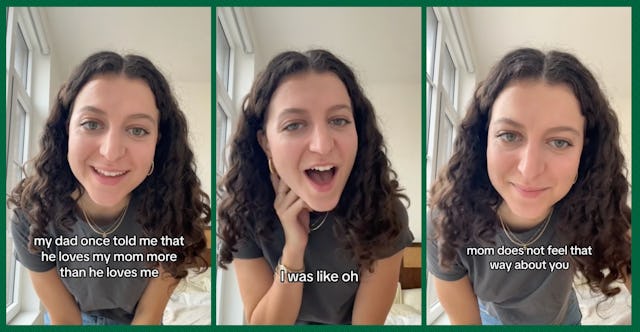Should Parents Love Each Other More Than They Love Their Kids?
A viral TikTok has started a parenting debate, and (surprise, surprise!) the internet is divided.

When it comes to parenting, people tend to pick sides over... well, everything. Many of these great debates are relatively innocuous. Should you invite your kid’s entire class to their birthday party? How often should you wash your kid’s tub between baths? Should you let your kid climb up the slide at the playground? Then there’s the most loaded of all loaded parenting questions, and one that has sparked a healthy debate due to a now-viral TikTok video: Should parents love each other more than they love their kids?
Comedian and TikToker Yvette Segan recently shared an interesting conversation she’d had with her dad when, seemingly out of nowhere, he admitted that he loved his wife (aka her mom) more than he loved Yvette, his daughter.
While she seemed taken aback at first, she captioned the video by saying that she felt like it was the correct dynamic for a family. Segan also ended with a pretty funny note on who she thought Mom loved more, prompting a shoot-off debate: Is a dad’s love different than a mom’s? Should they be?
“My dad once told me that he loves my mom more than he loves me. Completely unprompted,” Segan recounts the awkwardness. “I was like, ‘OK, thanks. OK, cool.’ Then he was like, ‘Well, your mom gave me you. So, of course I love her more.’”
Segan said she thought that was “kind of sweet” before hilariously adding, “And then I thought about it, and I was like, ‘Mom does not feel that way about you,’” she says, laughing.
So, is this universal? Is there always a disparity between the love a parent feels for their partner vs. their offspring? Depends on who you ask. There’s usually a vein of truth in these types of topics that strike a nerve with so many people. Some people think that, whether she genuinely loves her kids more than her partner, moms make their kids *feel* “more loved.”
Segan’s post is only 27 seconds, but you could spend all day wading through the comment section — a veritable goldmine of peeks inside various family dynamics. And naturally, everyone has opinions on Yvette and her dad’s confessions.
“I think this is the best family dynamic. Moms are usually all about the kids/family, and this way someone is all about her,” commented @ellishahardison.
“As a mom, I can guarantee that your mom loves you more than she has ever loved anyone ever. Nothing comes close to the way I feel about my kid,” wrote @the.sam.b.
Suggested @gabpdb, “That is the correct dynamic, tbh. Kids have to grow and become their own person; your partner will always be there. Also, they’re different kinds of love.”
Granted, not everyone agreed. As with most things related to parenting, this topic is highly nuanced.
“I can categorically say that I’ve never loved anyone more than my children,” wrote @mrgarethrw, followed by many people who agreed with the proud dad and even thanked him for “some sanity.”
@wingedmaybug pointed out that a parent’s love for their partner and love for their kid aren’t mutually exclusive, saying, “How about there’s different kinds of love for different people in your life. It’s not about more; it’s just different.”
Then, of course, some commenters insisted that kids come first for both parents. There were even kids who agreed they felt that way growing up.
“I think both my parents love me more than they love each other. lol,” wrote @woaxxitsamanda.
“My husband and I both know and accept that we’re just runners-up to our daughter. As we should be!”
Perhaps the comment that really hit the nail on the head, though, was less about a parent’s love for their kid and more about a kid’s love for their parents, especially Mama.
“I would have looked that man dead in the eye and said, ‘Same,’” wrote Mandynixx, clearly a mama’s girl. And, uh, Same.
This article was originally published on